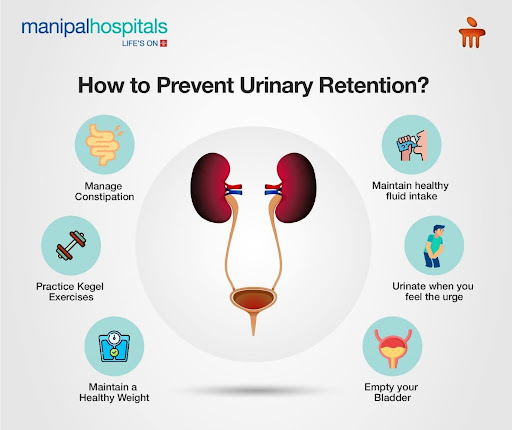
When the bladder muscles are unable to contract effectively or a blockage prevents urine flow, complete emptying becomes impossible. This condition, known as urinary retention, can cause significant discomfort and potentially lead to complications if left untreated. It disrupts daily routines and can lead to health complications if left untreated. Both genders commonly experience this condition, with elderly individuals being particularly prone to its development. While certain factors increase the risk, early diagnosis and treatment are essential to prevent complications. Let's delve deeper into understanding the phenomenon of urine not passing, its symptoms, causes, and how to manage it effectively.
Synopsis
What is Urinary Tract Retention?
Our urinary system plays a vital role in eliminating waste products from the body. Ideally, when you feel the urge to urinate, your brain sends signals to your bladder muscles, prompting them to contract and expel urine. However, in urinary retention, this process gets disrupted. The bladder muscles might be too weak to contract effectively, or there might be a blockage preventing urine flow. This leads to a build-up of urine in the bladder, causing discomfort and a range of symptoms.
Signs and Symptoms of Retention of Urine
-
Difficulty initiating urination
-
Weak or interrupted urine stream
-
Urgency to urinate
-
Unable to urinate despite the urge
-
Abdominal discomfort or pain
-
Swelling in the lower abdomen
Consult our Urology Hospital in Goa if you face any of these symptoms.
Causes of Urinary Retention
Several factors can contribute to urinary retention. Let's explore some of the factors that can lead to the condition:
-
Prostate enlargement: Common in older men, an enlarged prostate can obstruct the urethra, leading to urinary retention.
-
Nerve damage: Conditions like diabetes, spinal cord injury, or multiple sclerosis can affect nerve signals to the bladder, causing difficulty in emptying the bladder or retention
-
Medications: Certain medications, such as diuretics, pain relievers, and antidepressants, can relax bladder muscles or cause constipation, both of which can contribute to retention.
-
Urinary tract infections (UTIs): Inflammation from UTIs can disrupt normal bladder function.
-
Bladder stones or tumours: Obstructions in the bladder can hinder urine flow.
-
Constipation: A full rectum can compress the bladder, making it difficult to empty.
-
Pelvic organ prolapses: When pelvic organs, such as the bladder or uterus, descend into the vagina, it can obstruct urine flow.
-
Pregnancy: The growing uterus can put pressure on the bladder, leading to temporary retention in some women.
Diagnosis & Treatment of Urinary Retention
You may undergo a physical examination, a medical history, and tests to diagnose urinary retention, including:
-
Urinalysis: Analysing a urine sample for signs of infection or other abnormalities.
-
Post-void residual (PVR) measurement: Using ultrasound or a catheter to measure the amount of urine left in the bladder after voiding.
-
Urodynamic testing: Assessing bladder and urethral function using specialized equipment.
Some Common Urinary Retention Treatment Options
-
Medications: Alpha-blockers or 5-alpha reductase inhibitors may help relieve symptoms of prostate enlargement.
-
Catheterization: Inserting a catheter to drain urine from the bladder temporarily.
-
Surgery: Procedures like transurethral resection of the prostate (TURP) may be necessary to relieve obstruction.
-
Nerve stimulation: In some cases, electrical stimulation of the nerves responsible for bladder function can be used to improve control and reduce symptoms.
-
Lifestyle changes: Drinking plenty of fluids, avoiding caffeine and alcohol, and maintaining a healthy weight can help prevent urinary retention.
Book an appointment with our Urology Doctor in Goa to map out your ideal treatment plan.
FAQ's
Acute urinary retention is the sudden, complete inability to urinate. It requires prompt medical treatment to avoid kidney damage.
Yes, urinary retention can occur in children due to nerve issues, constipation, structural abnormalities, or injuries/trauma.
Urinary retention is more common in older adults, especially men with an enlarged prostate gland (benign prostatic hyperplasia).
Yes, diabetes that causes nerve damage (diabetic neuropathy) is a risk factor for urinary retention.
No, urinary retention and overactive bladder are different conditions. An overactive bladder causes frequent urination urgency rather than difficulty emptying.





















 4 Min Read
4 Min Read
















